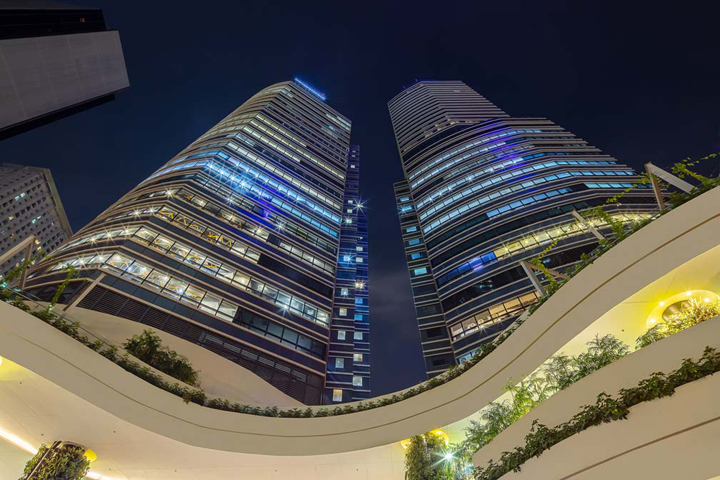The entry of the real-estate investment trust (REIT) will be a growth catalyst for the Philippine market, according to the country's leading real-estate management and investment companies.
In a press briefing held July 31, Colliers Associate Director Joey Roi Bondoc stressed it would be a good move if business people divest their industrial assets into REITs. He added that developers will be tapping REIT to become more competitive in the local market.
Bondoc cited DoubleDragon's grand entry into the REIT market signing a P3.97-billion ($82.7 million) deal with Jollibee Foods Corp. to create the Philippines's first and largest industrial REIT.
"We encourage investors to further explore the viability of industrial REITs in the country. In our view, the industrial segment continues to record growth amid Covid, and we see it thriving beyond 2021," Bondoc said.
Property titan Ayala Land Inc. was the first developer to enter the market through AREIT Inc. (AREIT), the real-estate investment trust of Ayala Land Inc. (ALI), It recorded revenues of P1.95 billion in 2020 and Earnings Before Interest, Taxes, Depreciation and Amortization (EBITDA) of P1.58 billion, 3 percent and 4 percent higher than its REIT plan, respectively. Ayala North Exchange, the landmark gateway to the Makati Central Business District, was one of the original developments to be made part of AREIT Inc.'s property portfolio as it listed at the Philippine Stock Exchange.
In an earlier press briefing, JLL Philippines country head Christophe Vicic said the introduction of REITs in the Philippine market is a welcome development as it has been proven to be a successful investment tool in any country. For the real-estate companies, it is an additional way to grow the company as more investors are expected to come in.
"The beauty of REIT is it allows you to invest even if you are not a banker or a developer. It also helps partially in building the assets and be helpful in the recovery," Vicic said.
Meanwhile, JLL Philippines head of research and consulting Janlo delos Reyes said a REIT can help access the capital market and help expand their portfolio. "We expect more players to enter the REIT market," he said.
On his part, Cushman and Wakefield Philippines head of Research and Consulting and Advisory Services Claro Cordero Jr. pointed out that investors should check out REITs with a well-diversified property portfolio. By selecting a stable player, Cordero said investors will further shield expected returns against market downturns and cycles.
Given the kind of market environment and challenges posed by the Covid-19 pandemic, Cordero said it would be a good move to pick REITs that have assets that are spread across different sub-sectors and locations, such as within key commercial business districts [CBDs] in Metro Manila and other asset classes and growth areas outside Metro Manila.
"REITs with the ability to further diversify the kind and location of the properties in their portfolio would enable REITs to simultaneously provide downside protection and create value for its unit holders," Cordero added.
Cordero also stressed that REIT is an alternative and viable instrument because it provides a shield for investors from extreme market cycles. Further, it democratizes property investment and enables investors to share in the success and best practices of established property players and developers.
Although investing in REIT is slightly lower than the 10-year average return in the Philippine stock market and below the average dividend yields in Singapore and other markets, Cordero said there is high potential for upside in the local REIT market, as there are certain real-estate segments, such as the office and industrial markets that still pose high-growth potentials in the post-pandemic era.
Cordero said C&W expects more players to follow the AREIT lead in launching their own REIT offerings. He said approximately 2 million sq m of Grade 'A' office spaces, around 6 million sq m of shopping mall developments and approximately 1 million sq m of logistics and warehouse developments are potentially REIT-able. The major property players are also well-diversified in other asset classes such as infrastructure (e.g., toll roads, airports, among others) and utilities, which are particularly resilient during downward economic cycles.
Sheila Lobien, chief executive officer of the Lobien Realty Group (LRG) told the BusinessMirror in an e-mail interview that investors should be in any investor's portfolio because it is a safe investment with many safeguards and controls placed by the law on the REIT company before it can issue REIT.
"The increase in property values [especially if the land where the building is built is owned by the REIT company], the assured dividends as mandated by the law and the ease in buying the REIT stocks as the REIT company should be publicly listed, which also democratizes real-estate investing, are some of the reasons an investor may invest into REIT," Lobien said.
She said the entry of REITs in the local market has democratized the investment field small players can now join the leading players in broadening their investment portfolio.
Lobien provided three items for potential REIT investors to address the risks. First, an investor must check the profile of the company and study all the data and information of the company issuing the REIT. He or she should assess the underlying assets the REIT company has and study if these assets can reasonably deliver the profitability objectives as committed by the REIT company, Finally, the investment should align with the investor's overall investment profile.
Image courtesy of Rolly Barayang
Read full article on BusinessMirror


No comments:
Post a Comment